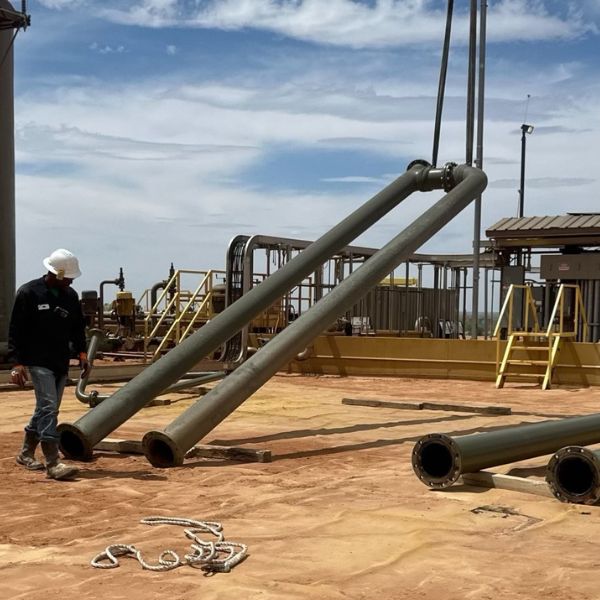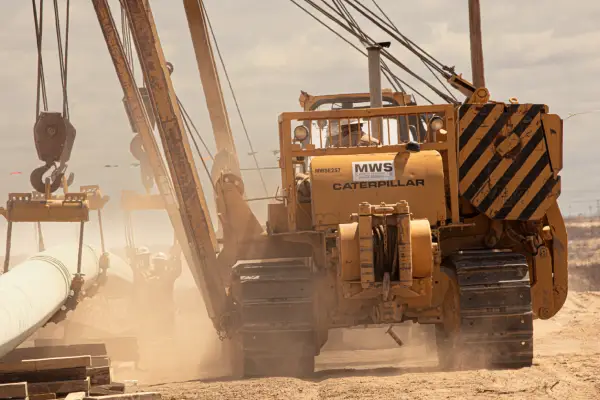How to Evaluate Experience and Expertise in Pipeline Construction Services
Wiki Article
The Crucial Overview to Recognizing Pipeline Construction Services and Their Relevance
Pipeline Construction solutions are basic to the transportation of vital resources such as oil, gas, and water. These solutions involve meticulous planning and implementation, sticking to strict security and environmental standards. As the sector adapts to modern-day obstacles, recognizing its elements and effects ends up being progressively vital. What aspects add to the expanding importance of these solutions in today's economy? The following areas will certainly explore these important elements.Review of Pipeline Construction Solutions
Pipeline Construction services incorporate a variety of activities essential for the installation and maintenance of pipelines made use of to deliver various substances, including water, oil, and gas. These solutions are vital for assuring the safe and efficient motion of sources from one area to one more. The procedure normally starts with detailed planning and layout, which takes into account regulative demands, environmental factors to consider, and logistical obstacles.As soon as preparation is full, excavation and grading of the land are performed to prepare the website for Pipeline installation. This is followed by the real laying of the pipes, which involves welding or joining areas with each other to produce a constant circulation path. After installation, rigorous screening is carried out to guarantee honesty and safety. Maintenance services are also given to deal with any issues that might emerge gradually. On the whole, Pipeline Construction services play a crucial role in sustaining infrastructure for energy and water distribution.
Key Parts of Pipeline Construction
A successful Pipeline Construction task counts on numerous vital elements that assure the efficient and safe installment of the Pipeline system. Initially, complete website evaluations are essential, as they identify the geographical and ecological elements that might influence Construction. Next off, the choice of ideal products, such as fittings and pipes, is vital for securing longevity and compatibility with the transported compounds.Progressed Construction strategies, including trenchless technology and directional boring, enhance performance and minimize environmental effect. Effective project administration is one more important component, coordinating labor, tools, and timelines to meet task objectives.
Furthermore, communication amongst stakeholders, consisting of designers, service providers, and regional authorities, guarantees placement on project specs and demands. Finally, extensive quality assurance measures throughout the Construction process make sure compliance with market criteria and make best use of the Pipeline's operational lifespan. Jointly, these elements form the foundation of an effective Pipeline Construction task.
Safety Specifications and Rules in Pipeline Construction

Governing bodies, such as the Occupational Safety and Health And Wellness Administration (OSHA) and the Pipeline and Hazardous Products Security Management (PHMSA), stated particular needs that regulate Construction practices. These consist of protocols for devices use, worker training, and emergency action procedures. By carrying out these criteria, Construction companies not only shield their workers however likewise protected public depend on. Eventually, extensive precaution add to the long-lasting success of Pipeline projects, ensuring they fulfill both ecological and functional assumptions.
Ecological Considerations in Pipeline Projects

Ecological considerations are essential to the planning and implementation of Pipeline tasks. These projects should evaluate prospective impacts on environments, water sources, and local wild animals. Carrying out extensive environmental impact evaluations (EIAs) is crucial, allowing stakeholders to recognize and minimize risks before Construction starts.
Securing delicate areas, such as wetlands and environments, usually requires applying specific design features or alternate routing to lessen interruption. In addition, Pipeline drivers are entrusted with establishing approaches for preventing spills and leaks, which can have devastating effects on the atmosphere.
Involvement with neighborhood communities is essential, as public issues can cause task adjustments that boost environmental management. Compliance with laws established by environmental companies guarantees that jobs meet sustainability criteria, fostering an equilibrium in between facilities demands and ecological preservation. Inevitably, attending to environmental considerations not only safeguards nature however additionally advertises community count on and project viability.
The Function of Modern Technology in Pipeline Construction
Modern technology plays a necessary function in contemporary Pipeline Construction, improving efficiency and accuracy. Advanced evaluating strategies allow for specific planning and implementation, decreasing ecological impact and job hold-ups. In addition, the integration of automation and robotics improves procedures, reducing labor costs and enhancing security on Construction sites.Advanced Checking Methods
Advanced checking strategies play an important function in the effective execution of Pipeline Construction tasks. These techniques utilize sophisticated modern technology to ensure precise mapping and evaluation of the terrain where pipelines will certainly be installed. Methods such as Geographic Details Systems (GIS), LiDAR (Light Detection and Ranging), and 3D modeling make it possible for designers to assess the landscape and visualize, determining possible obstacles and ecological concerns. By using these innovative devices, groups can enhance precision in positioning and alignment, significantly reducing the danger of errors throughout Construction. Additionally, real-time data collection permits instant changes and notified decision-making throughout the job lifecycle. Eventually, these surveying advancements add to improved efficiency, safety, and sustainability in Pipeline Construction initiatives.Automation and Robotics

Economic Impact of Pipeline Infrastructure
Pipeline framework plays a crucial duty in assisting in and forming local economies profession. By giving a trustworthy methods of carrying oil, gas, and various other commodities, pipelines lower transport prices and boost supply chain efficiency. This facilities see here draws in financial investment, promotes work development, and cultivates economic growth in surrounding locations.Furthermore, the Construction and upkeep of pipelines add considerably to regional economic climates, producing many job opportunity in various industries, from engineering to labor. The increase of jobs often causes boosted costs in neighborhood services, additionally reinforcing economic task.
In addition, pipelines enhance energy security by making certain a stable supply of sources, which is important for property demands and industrial operations. As regions come to be adjoined with Pipeline networks, they get to broader markets, increasing competitiveness and economic strength. The economic effect of Pipeline framework is multifaceted, influencing both immediate neighborhood economic climates and more comprehensive local growth.
Future Trends in Pipeline Construction Solutions
The future of Pipeline Construction services is progressing in action to technological innovations, regulative adjustments, and growing environmental factors to consider. Developments such as robotics and drones are improving examination and maintenance processes, boosting safety and security and performance. Automation is poised to reduce labor expenses and increase accuracy in Construction operations. Furthermore, the increasing emphasis on sustainability is motivating companies to take on environment-friendly materials and methods, straightening with global efforts to lower carbon footprints.Regulative structures are also adapting to resolve environmental effects, pressing for higher openness and accountability in go to this web-site Pipeline jobs. In addition, the integration of wise modern technologies, including real-time tracking systems, is anticipated to improve the dependability and efficiency of Pipeline networks. As power needs shift toward sustainable sources, Pipeline Construction solutions will likely see an increase in tasks associated with biofuels and hydrogen transportation. On the whole, these trends indicate a transformative period for the Pipeline Construction industry, concentrated on technology and sustainability.
Frequently Asked Concerns
What Types of Pipelines Are Frequently Created?
Different kinds of pipelines are commonly constructed, including oil, water, sewer, and gas pipelines - Pipeline Construction Services. Each offers distinct functions, promoting the transportation of vital resources throughout areas while sticking to safety and environmental guidelinesFor how long Does a Typical Pipeline Job Take?
The period of a regular Pipeline project differs considerably, commonly ranging from several months to a few years. Variables affecting this timeline include project intricacy, regulative approvals, and ecological factors to consider that need to be dealt with.Who Manages Pipeline Construction Business?
Pipeline Construction business are regulated by numerous government, state, and local firms, including the Pipeline and Hazardous Materials Safety Management (PHMSA) and state utility commissions, making certain compliance with safety and ecological requirements throughout the Construction process.What Are Common Materials Used in Pipeline Construction?
Typical materials utilized in Pipeline Construction include steel, pvc, and polyethylene. Each material provides distinctive advantages such as durability, versatility, and resistance to corrosion, making them appropriate for numerous applications in transferring gases and fluids.
Exactly How Are Pipeline Construction Costs Estimated?
Pipeline Construction prices are approximated by analyzing factors such as product costs, labor rates, task intricacy, environmental considerations, and regulative requirements (Pipeline Construction Services). Exact price evaluation guarantees reliable budgeting and job preparation throughout the Construction procedurePipeline Construction services encompass an array of activities essential for the installment and maintenance of pipelines used to move different substances, consisting of water, gas, and oil. An effective Pipeline Construction project relies on numerous essential parts that ensure the effective and risk-free setup of the Pipeline system. Advanced checking methods play a necessary duty in the successful execution of Pipeline Construction tasks. Various kinds of pipes are commonly constructed, consisting of oil, water, gas, and sewage pipelines. Pipeline Construction expenses are approximated by evaluating variables such as material costs, labor prices, job intricacy, environmental considerations, and governing requirements.
Report this wiki page